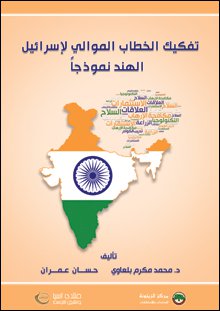Al-Zaytouna Centre, in collaboration with Asia Middle East Forum, has published a new Arabic book, “An Analysis of the Pro-Israel Discourse: India as a Case Study,” authored by Mohammad Makram Balawi and Hassan Ben Imran. The 102-page book consists of three chapters studying the Israeli discourse that established the Israeli-Indian relationship and penetrated the ruling policy-maker elite.
| >> Free Download: Chapter Two (Section1) Arabic |
Publication Information Arabic – Title: Tafkik al-Khitab al-Muwali li Israel: al-Hind Namudhajan (An Analysis of the Pro-Israel Discourse: India as a Case Study)- Author: Mohammad Makram Balawi and Hassan Ben Imran |
 |
By the end of the cold war, Israel changed its policies in order to forge new relations with countries that were hostile to it in the past. It looked into the needs of those countries, and developed its rhetoric to make it correspond to their needs. Hence, it reached its goals, as in the case of India, which was a bitter enemy of Israel in its foreign policy, and now they are close friends.
Chapter One discusses the Indian policy towards Palestine and Israel before 1947, i.e., during the British colonization. Then, during the post-independence era until the end of the cold war (1947–1992); during which India was—internationally and among The Non-Aligned Movement (NAM)—a strong supporter of the Palestine issue. After 1992, the Indian government saw that Israel has emerged a winner out of the cold war, and that the Palestinians negotiated, privately and publicly, with Israel and are about to sign an agreement with it; as a result, it established diplomatic relations with Israel. Then, after the Oslo Accords in 1993, the Indian government stances towards the Palestine issue became more pragmatic, providing limited support to the Palestinian Authority (PA), while at the same time forging relations with Israel at all levels; in the areas of space technology, missiles, security, agriculture and irrigation, etc. India has become the largest importer of weapons from Israel, in addition to other aspects of cooperation.
This chapter also addressed the Indian political scene in 2018, when the ruling party Bharatiya Janata Party (BJP) rose to power, along with Prime Minister Narendra Modi, whose ideological mentor is the Rashtriya Swayamsevak Sangh (RSS) organization that advocates a Hindu nationalistic agenda, under the banner of “Hindutva” or “Hinduness.” It believes that India is for the Hindus, and that the Muslims are foreign components for whom India has no place. The chapter reviewed the possible scenarios for the rule of the country, and provided a general overview of the political process in India and the performance level of the ruling party.
Chapter Two discusses the Indian pro-Israel discourse, promoting Israeli military technology, and the advanced electronic, nuclear or aerospace technology, in addition to the Israeli expertise in the fields of agriculture and water treatment, and claiming that Israel has the security expertise in defense and fighting “terrorism,” which is popular in many countries. The discourse also promoted attracting Israeli investments, mentioning that the strong Israeli-US relations allow Israel to pave the way for India to have better relations with the world’s superpower. Training of cadres and development of human resources were also mentioned, in addition to other reasons studied in detail.
Chapter Three studies the characteristics of the Indian pro-Israel discourse, such as the mitigation of India’s internal problems, and the claim that the relationship with Israel is the only way forward. It is an Islamophobic discourse that distorts the image of Indian Muslims, and portrays them as an imminent danger, pointing out that Israel can help in the fight against their threat based on its previous “experiences.” The discourse tries to overlook the immoral role of Israel, hide its ugly face, and justify the Indo-Israeli relationship, thus reflecting the state of guilt of giving up on the real historical support of the Palestine issue.
Chapter Four discusses the legal aspect of relations with Israel, and that states must abide by international conventions, knowing that Israel is largely an outlaw state that refuses to comply with any resolution that opposes its will regardless of international consensus.
At the end, the authors made recommendations to pro-Palestine writers and academics, the Palestinian leadership, Arab states and other countries, specifically the contracting parties to the Fourth Geneva Convention, human rights organizations and the organizations active in the boycott movement against Israel.
| >> Free Download: Chapter Two (Section1) Arabic |









Leave A Comment